➢ Víctor Moreno presents in Lovebirds a hotel as solitary and soulless as its lead, Nicola Pedrozzi
➢ David Pantaleón also deals with the time of restrictions in his Requiem for the party
➢ Rafael Montezuma displays a visual poem in his Bancal, a short film full of symbolism
➢ Rosa P. Almeida has filmed in Martes de Carnaval an intimate portrayal of the artist and person she once was
➢ Víctor Giner and Juan S. Betancor bring us closer to the Beijing of ‘deliveries’ in the exotic Waimai
Las Palmas de Gran Canaria, Wednesday 20 April 2022.- Pandemic environments, memory and solitary adventures are some of the elements appearing in the first short film session of the Las Palmas de Gran Canaria International Film Festival’s Canarias Cinema section, which will be starting on Friday April 22 at Cinesa El Muelle. Five heterogenous pieces, as to be expected in a short film screening, will take the audience into an inhospitable rather than nice contemporary world, where the individual’s point of view gains unusual significance. Víctor Moreno, David Pantaleón, Rafael Montezuma, Rosa P. Almeida and Víctor Giner are the main filmmakers of this first batch of cinema with Canarian accent -and talent-.
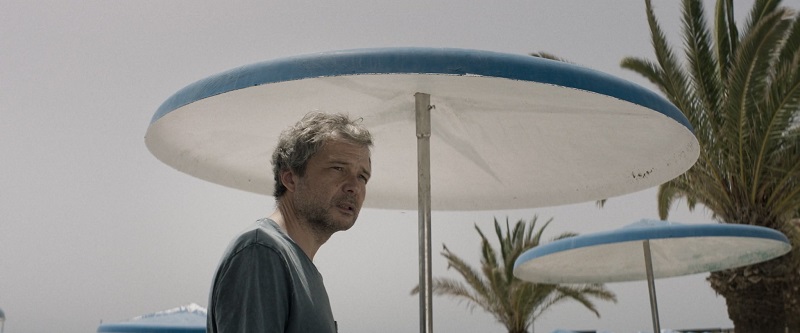
Lovebirds, by Víctor Moreno
In this opening short film session of Canarias Cinema we find Lovebirds, Víctor Moreno’s piece that revolves around a character played by Nicola Pedrozzi, “who was interested in the two of us working together, and asked me to think something for him after we met in Los Ángeles,” reveals Moreno.
The filmmaker from Tenerife is already a well-known regular of the Las Palmas de Gran Canaria International Film Festival. He’s directed the feature films Edificio España (2014) and Holidays (2010), as well as the short films Fajas y corsés (2007), Fauna humana (2008), Felices fiestas (2008), El extraño (2009, Grand Jury Prize at Notodofilmfest), La Piedra (medium-length film from 2013) or Diarios móviles (2012).
He’s also made The Hidden City (2018), Richard Leacock Award at the 2019 Las Palmas de Gran Canaria International Film Festival and Best Documentary Award at the 2020 Feroz Awards granted by AICE [Association of Spanish Film Journalists]. A work that was screened as well at New York’s Lincoln Center on magazine FilmComment’s initiative and which proposes a meticulous esthetic journey through the tunnels and pipes under Madrid that render a service that maintains the city.
Lovebirds’ screenplay was written by Claudia León and Víctor Moreno himself. It stars Nicola Pedrozzi, a client in a soulless hotel during the pandemic in which Christiane Dollmann, the only worker of the establishment, offers him a singular counterpoint. “At first we thought of a solitary man in an empty hotel, before the pandemic,” explains Moreno regarding the preparation of his latest short film. “In the end we decided to set it in Tenerife. And just when I came the pandemic arrived, too. What it would’ve been a problem, finding an empty hotel, turned into an opportunity: ¡they all were empty!”.
Furthermore, the director went to an establishment “where I stayed as a kid, somewhat a symbol of the touristic development back then. We later added masks and all the stuff related to the pandemic. We wanted to capture loneliness, isolation, and all those elements helped a lot.”
Lovebirds was filmed in less than three weeks, “just after confinement ended, I think it was the first fiction shooting in Tenerife after the halt. It was something very crazy for a crew of twenty people. All those circumstances made me set the story in pandemic times. A little bit like the absurdity of everything, too.”
Pedrozzi is the one that carries this story located in a solitary hotel with a single employee for everything. “Ultimately, Nicola came from a very different acting method, too Italian-like. I wanted to take him with my work to something more inexpressive, more alienated, in which the slightest would carry an enormous weight. He did an amazing job,” summarizes the Canarian director.
Christiane Dollmann was his counterpoint, “who arrived pretty quickly through casting. We were lucky she appeared out of nowhere. A solitary worker who at the same time turns into a somewhat protector of Nicola.” And, Moreno admits, “it does exist a sort of growing tension between them, between the two characters.”
The filmmaker discovered in the final editing that “I was attracted by that Purgatory message, of a place between life and death. And maybe that’s why I tried to be more cryptic.” The short film, he continues, “has been at Malaga, where it premiered last year, then at Cinespaña, South Korea, Tallin. It’s already been shown in twenty festivals, plus those still remaining. I’m very happy, knowing that it was a short film set in a very particular moment: but it won’t go out of fashion, as part of the crew feared.”
Moreno adds that “I’m always delighted to come back to the Festival, because it has seen me grow. The first time I came was in its third edition. It has given me a lot, allowed me to know a lot and a lot of people. This year we are presenting in MECAS’ Films-to-Be-Made my new feature, El exterior, which has been at Rotterdam and Torino. It is essentially a fiction.” The future? “We’ve already filmed part of another short documentary. Yes, I’ll get more into fiction, but without forgetting documentaries,” advances the director from Tenerife.
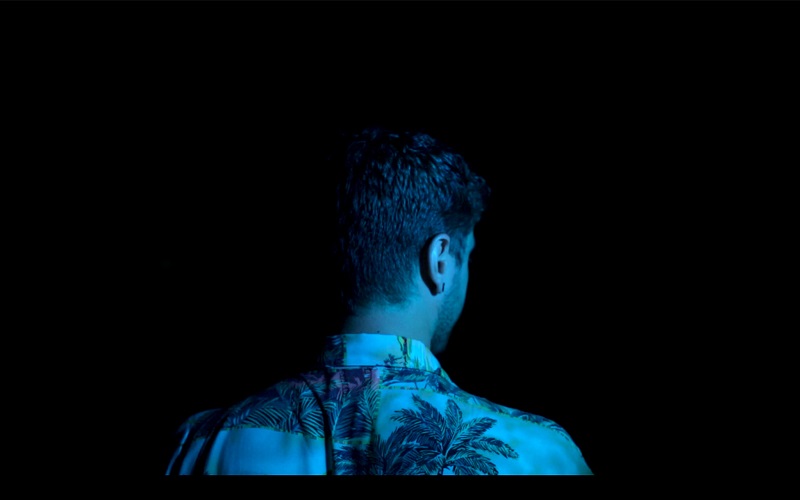
Requiem for the Party, by David Pantaleón
David Pantaleón is one of the protagonists of this new edition of the Las Palmas de Gran Canaria International Film Festival’s Canarias Cinema. In 2022, he is not only participating with his first feature film, Rendir los machos, but also with a new short film, Requiem for the Party.
Pantaleón is a prolific short film maker that’s filmed over 25 works. A graduate in Dramatic Art and a teacher of acting at the Escuela de Actores de Canarias [Canary Islands’ Acting School], in this session he presents a brief and intense work which challenges the audience through the model it proposes: a constant flickering of close-up shots of different people in the style of those pictures offered by nightclubs’ flashing lights.
It is, in fact, a piece “thought, filmed, edited and released” during the XVI La Palma International Digital Film Festival (Festivalito), just like it says in the credits of this film produced by Los de Lito Films. The theme for this Festivalito’s edition was “I’m not an algorithm”. He handled himself well when making his piece because “I’ve been coming to the Festivalito for fifteen years or so, and I’ve been learning to create things with less elements every time, while being aware that you come to that festival to help others with their works, too. The mechanism for the shooting of the film was fundamental. It was more a question of us being active rather than being too focused on the actors. And it turned out well.”
The director stands by a piece “that plays with a feeling intended to be aroused in the audience. Little by little the audios reveal what it is all about. Audios extracted from YouTube and generated by the police. We tried to play with that concept of ultra-watchfulness and aggressiveness in regards to something so natural and necessary as partying.”
Pantaleón admits that the short film “is nothing but an ironic game. It’s been made during pandemic times, so it is contextualized there. But if you were listening audios from a Russian or Ukrainian radio you could also think those guys were in a hiding place in the middle of the war.” The filmmaker started to devise the short film by thinking that human beings “aren’t always inclined to respect the rules.”
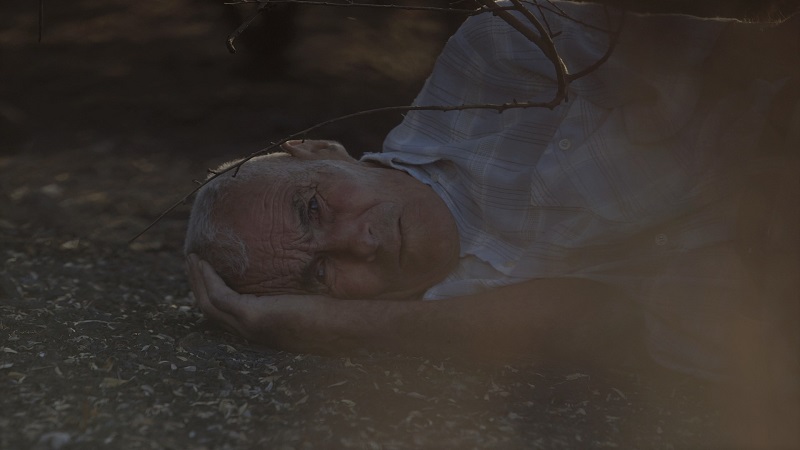
Bancal, by Rafael Montezuma
“I think it’s never been done in this audiovisual way in the Canary Islands, extrapolating those masonic terms to the short film work.” It is difficult to disagree with Rafael Montezuma, a filmmaker who offers a different documentary, full of hidden symbols, utopian inspiration and such an attention towards a production built with craftsmanship-like spirit. His latest work, Bancal, has appeared noticeably and successfully at festivals such as IDFA, MiradasDoc, Go Short and D’A Film Festival Barcelona.
Montezuma’s career as a short-film maker is as brief as outstanding. He’s proved it in his previous Voces del barranco (2019), Pillimpo (2019), Hiram (2018) and Dua2litet (2018). He obtained in his debut the Dimensions Award in the Short Short Story Film Festival in Providence (USA). With Hiram he won a prize at the Athanatos Inmortal contest, organized by the Canarian Institute of Bioanthropology. Furthermore, among other things, he’s directed Cockfight, by Humberto Vélez.
The Canarian filmmaker has found in masonry a motif that serves as a starting point when building his pieces. “Those secrets always exist, that sensitive background weave. We’re alluding there to masonry concepts, which are the ones that always drive me. It is not about preaching, I’m interested in the ritual, in what’s related to its geometry, its concepts.”
In Bancal, he also intends “that the audience can interpret the short film through forms, symbols and gestures in their own way. There’s no need to understand there’s a masonic concept in it: there are a lot of layers when it comes to interpreting all this. Bancal is devised so that the people who watch it may have a sensory experience.”
The short film revolves around Maestro Santiago, the island landscapes he inhabits, his work as stonemason. With this piece, Montezuma attempts to do “as always”, that is, “revealing what’s hidden. Yes, on the surface he may be an old man who keeps cutting stones, and those memories from his past: there’s a real platform, because he’s made those numbers there, but then there are some fictional elements, the relationship of human beings with the Cosmos. In my interpretation, he understands the sensible weave that moves the world, he looks at things that nowadays receive no attention at all. His guide is nature’s fractal architecture.”
It is at this point where the filmmaker draws inspiration from masonic symbols, because “light and stone are elements of masonry. They are reminiscences from my past, from my family. Stone is the building element of not only an interior temple, but also of a community temple. Bancal,” he summarizes, “is a utopia about a balanced society.”
A hidden and cryptic utopia that unfolds with great visual impact in the short film, cowritten and edited by Ivó Vinuesa. “He’s been a fundamental piece,” points out the director, “who has already made the same job, for example, in On the Name of the Goats (Silvia Navarro Martín and Miguel G. Morales, 2019), which to me is the most important work produced in the Canary Islands in regards to identity and colonial issues.”
In Bancal, Montezuma goes more deeply into it “from a feeling’s standpoint: that is how all the filming process has been, with pictures engaging in a dialogue with one another just as each stone shapes the terrace wall.” With a light that comes “from the East, because everything began from the East to the West,” continues the filmmaker, who would like the audience to draw their own conclusions according to their sensitivity towards the pictures. He insists, though, that the short film has been made “following Maestro Santiago’s same way of working, craftsmanship-like, which was the one we also had when filmmaking.”
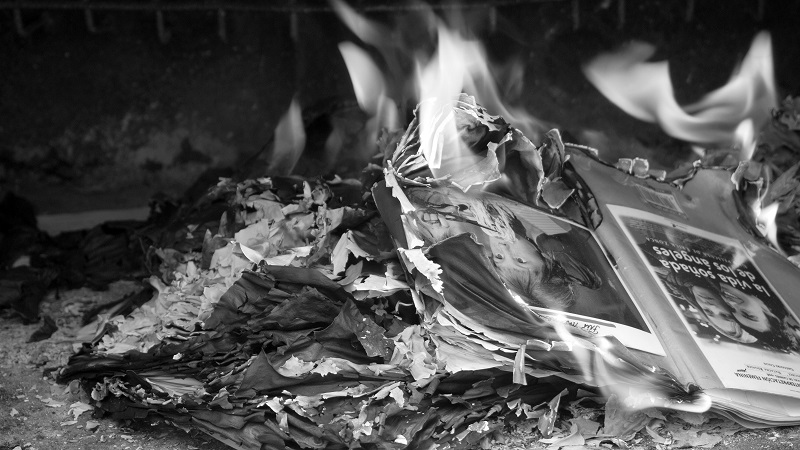
Martes de Carnaval, by Rosa P. Almeida
“Two young women in love have a date 20 years later. Present imposes itself – they cannot meet face-to-face. However, the imagined memory persists.” That’s the synopsis of Martes de Carnaval (Ash Wednesday’s Eve), a short film in which memories burn, literally, in front of the audience. They do so on a barbecue whose image yields in fact to the weight of disjointed conversations on the telephone.
Rosa P. Almeida is the filmmaker of this short film that she has edited, added the sound track to, filmed, written and, of course, directed. It is her third one in three years, after Inaudible (2021) and Mantenga la derecha (2020). Having started her film career in 2007 (when she made the documentary Galápagos en Canchalagüeras), Almeida currently works as a teacher at the Escuela de Arte y Superior de Diseño Gran Canaria, and is also an active multimedia artist. In 2002, she created with Teresa Ruano and other communication professionals Silencio (mujeres rodando) [Silence (women filming)], “a very nice stage, that lasted ten or twelve years.” She now works with RAV Anarcos-Rosa Palmeida “on performative projects.” She is as well the one responsible for the performance of La señora del carrito, “in a project in which I deal with touristification of neighborhoods.” Furthermore, continues the filmmaker, “I’ve been quite a few years working and experimenting with sound.”
Martes de Carnaval is her latest short film, “a part of a trilogy that began ten years ago. Although this is the first time I submit something to the Festival.” The piece is another link within the task Almeida has imposed herself when “exploring the relationships I may have with memory, continuous changes in human beings and death. From a personal as well as a social point of view. There are a lot of things mixed there. Philosophy, Chris Marker’s cinema…”
The filmmaker, best defined as an audiovisual artist, says that “when I turned 40, I burnt all my notebooks containing ideas, scripts, thoughts, projects and poems.” As an almost perverse relationship between the artist and her work, she decided to filmed it. “I took photos. It was somewhat a din. And I couldn’t edit all of it at that moment.”
Later on she did find the sufficient disposition to build this intimate piece, “a representation of what I once was. When I look at me in that film, I already know I’m not that person. It’s an exploration rather than an autobiographical documentary.”
It winds up being more important “the fact that my burning of all that mixes with a date two lovers set in the past for when they turned forty. And obviously the present imposes itself, and we can’t see each other. But that’s not the important thing: because the main idea is that I imagined myself so many times in that date that in the end I didn’t care about what had happened. What I imagined was as intense as if it had in fact happened. I think it is super interesting to explore that the things we imagine are part of our experience.”
To sum up, her short film depicts two documentary events: the filming of her documents’ burning, and the audio recording of the conversation had during an Ash Wednesday’s Eve. The trilogy? It was first conceived around 2012. “There’s an unfinished documentary short that was at the L’Alternativa’s Hall, Prohibido escuchar, and that has to do with historical memory. There’s another one that has to do with childhood. That piece is at a very early stage. And it is probably, too, the most political one, since it combines politics and death. In Martes de Carnaval we enter maturity.” In its entirety, the filmmaker explores her relationships with memory, constant change and death from a personal as well as a social and political point of view.
Almeida explains that in the postproduction of the short film participated Dani Mendoza. “I wanted the fire to sound like rain. He did an excellent job.” In the final result, the director also explores other paths, such as the emotional relationship with the objects-works, the passing of time, self-reinvention, the intensity of existence, love in all its different forms… “The love that changes and the new ones that arise dance naughtily in this choreography in which I’ve just let myself be carried away until having the conviction of the final cut,” she concludes.
Almeida admits she is a regular of the Festival to which she now arrives as an author: “I always take my students to it and I love its programming. It is a different offer and I believe that the programming is very meticulous and avant-garde.” In that case, her students will have an extra incentive: their teacher’s work.
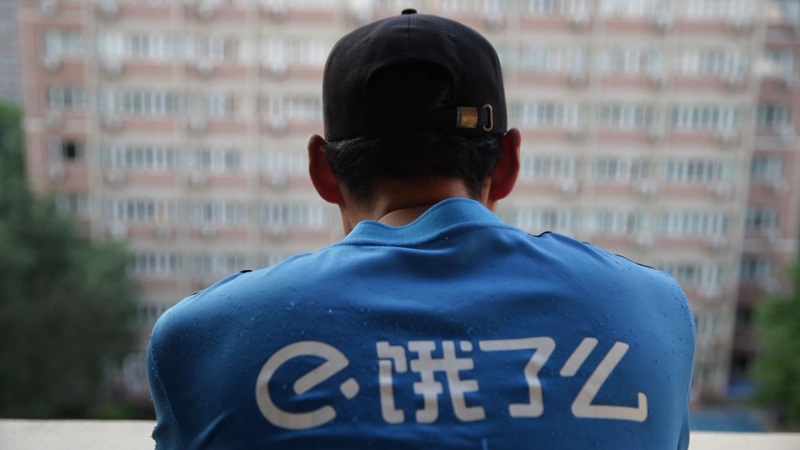
Waimai (Takeaway), by Víctor Giner
The most exotic piece of this first batch of Canarias Cinema’s short films is, without a doubt, Waimai (Takeaway) by Valencian Víctor Giner, in which the Canarian Juan S. Betancor works as producer, cinematographer and editor. “He’s been very generous allowing to sign the short film alone, he is its coauthor, too,” explains Giner, who thanks his partner’s implication in this particular enterprise: a filming that took place in September of 2019 in Beijing, only some weeks before the pandemic started in China.
All of it to tell Xiao’s story (played by He Dong Chao), who works fifteen hours a day, seven days a week, as a takeaway deliveryman in the colossal city. It is a documentary tale revolving around a man who lives as hooked to his motorbike as to his phone in order to complete his job. Through a subjective point of view (thanks to a GoPro, too), Giner shows the insides of the takeaway food distribution canals in the great Chinese city as well as its traffic arteries and the rhythm lived there.
Víctor Giner has already made in 2018 The Vanished Dream, a documentary in which he also worked with Betancor in order to portray the utopian dream lived in Guinea Bissau during the 70s, after its independence. A film that won the Richard Leacock Award at the Las Palmas de Gran Canaria International Film Festival and the Best Documentary Award at the Dallas African Film Festival (TAFF)
Giner is a law graduate and has studied International Development at the University of Louvain-la-Neuve (Belgium). He’s lived and worked in Marruecos, Guinea Bissau, China and, currently, Azerbaijan, managing cooperation projects. At the same time, he’s taken advantage of his vital experience to become the filmmaker of his own pieces, in addition to being a screenwriter and even a film critic. A passion he has nourished since his university years.
The director explains that “when I arrived at Beijing in 2013 there were a lot of online purchases already. Deliveries start from barely 50 cents. There are almost no shops in town, there aren’t first-floor business premises and you see a lot of boxes everywhere. I found that very striking. I was investigating the issue and in the end we filmed it.”
Giner adds that “another matter I was interested in was that of immigrant workers. In China, if you travel from one province to another you lose all your social rights: education, health, etc. There are 300 million people in the country in this situation. In Shenzhen, for instance, it’s more than half the population. And that is a city with a high standard of living.”
In order to choose the lead of a shooting that’d be short but very intense, the filmmaker had a casting, but not without prior taking advantage of his language studies to organize little interviews with different deliverymen. “In the end we could find our lead and film what it would be something like a day in his life.”
The result could probably surprise Western audiences, who suddenly may discover “a city with many layers, with a super authentic neighborhood life. It still has these contrasts, although it is also made and thought for cars.”
Visually, the director has captured in his short film how “neon lights have always fascinated me, it’s something present in Hong Kong’s cinema, for instance. We did try to capture that. This city has, above all, an incredible energy. I went on holidays for three weeks and during the time you weren’t there a building grew,” points out Giner.
In any case, the author didn’t think about making a sort of condemnation film depicting this deliveryman’s life: “We always understood it as a documentary,” he stresses. “We are talking about someone who has a very hard life for our standards, but in fact for them they are not that hard. It seemed to us very relevant to show it in Europe, because if we are not careful, we are advancing a little bit towards that. Toward the Chinese model: working twelve or fifteen hours a day.”
Giner already states his intention of “doing once again something with Juan in Azerbaijan, for sure.” Maybe in order to participate in a festival, the Las Palmas de Gran Canaria one, which he has followed since The Vanished Dream “I like a lot the programming line it has. It works very well on promoting Canarian film industry. And bringing foreign pieces with a very interesting program,” he concludes.
The Las Palmas de Gran Canaria International Film Festival, organized by the Culture area of the Gran-Canarian capital’s City Council through Promoción de la Ciudad de Las Palmas de Gran Canaria, has received public assistance by the ICAA [Institute of Cinematography and Audiovisual Arts] and the program for the internationalization of Spanish culture, PICE Visitantes, of Acción Cultural Española (AC/E).
Among the Festival’s collaborators we may find Cinesa El Muelle, El Muelle Shopping Center, Hotel Cristina by Tigotan, the Elder Museum of Science and Technology or Casa África, places which also function as seats or hold activities; as well as other institutions and companies such as Audiovisuales Canarias, Music Library & SFX or the International Bach Festival. Likewise, its market, MECAS, has been possible thanks to the sponsorship of the Gran Canaria Film Commission-Sociedad de Promoción Económica de Gran Canaria and the support of Canary Islands Film and Proexca.
The University of Las Palmas de Gran Canaria, the Mid Atlantic University, the Audiovisual Cluster of the Canary Islands, CIMA Canarias, the Asociación Microclima Cineastas de Canarias [Association of Filmmakers of the Canary Islands ‘Microclima’] and Repeople are also collaborators of the Festival.
Share this Post
